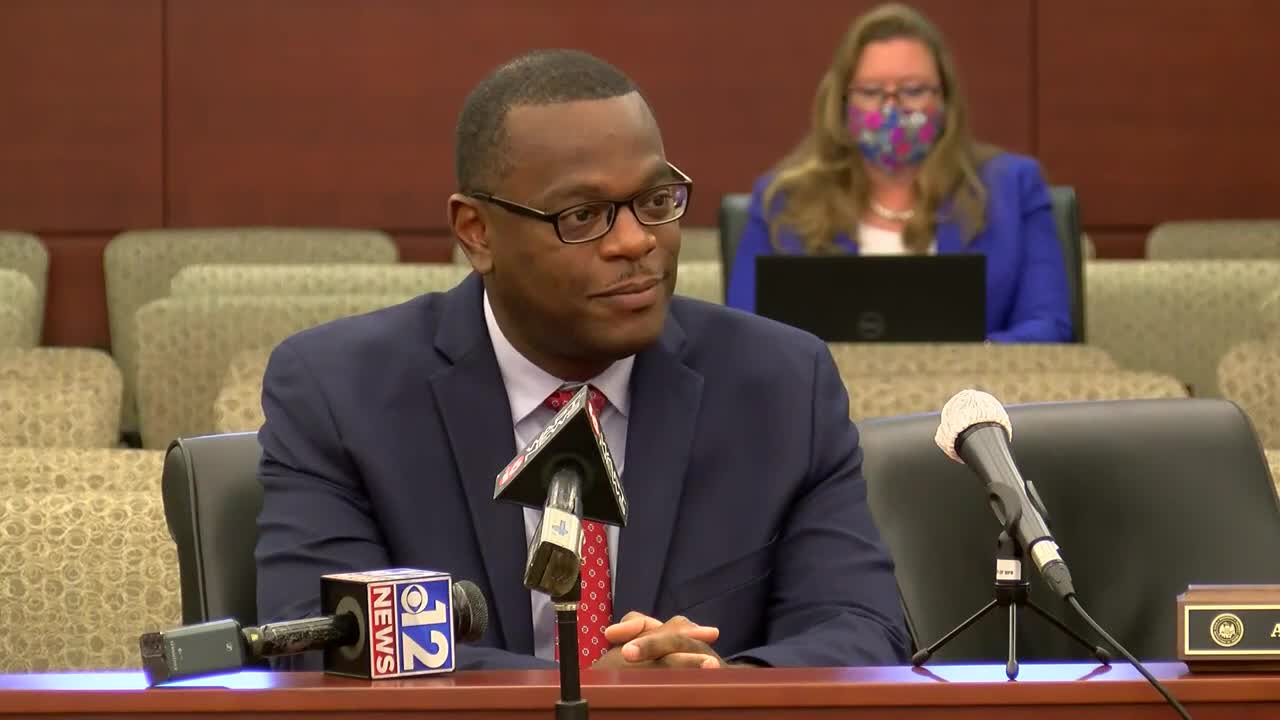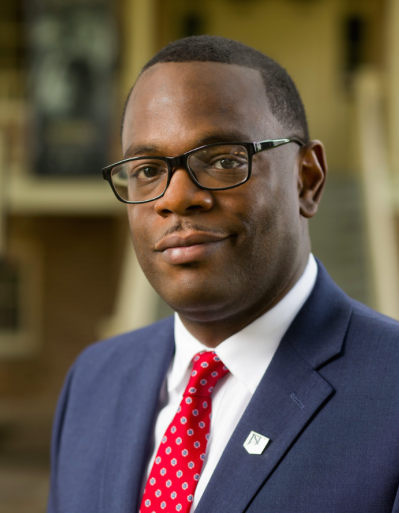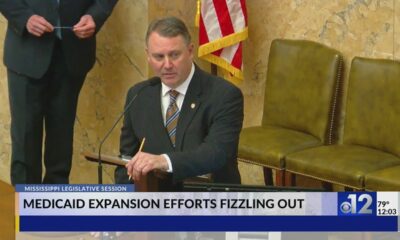Mississippi Today
IHL board voted to renew Hudson’s contract a week before no-confidence vote

IHL board voted to renew Hudson's contract a week before no-confidence vote
One week before the faculty senate at Jackson State University voted “no confidence” in President Thomas Hudson, the college board voted to renew his contract for another four years.
During an executive session after its regular monthly board meeting on Jan. 19, the Institutions of Higher Learning Board of Trustees voted to renew Hudson's contract through 2027. They also renewed the contract for Jerryl Briggs, the president of Mississippi Valley State University, for another four years.
The contract renewals were made public in this month's board book.
It is unclear if the contract renewal means Hudson or Briggs received a raise. As of last year, both presidents received a $300,000 annual salary from the state of Mississippi and an additional $5,000 foundation bonus.
The contract renewal signals the IHL board is supportive of Hudson as he is now dealing with the fallout from the faculty senate's no-confidence vote. A JSU alum, Hudson was appointed president in the wake of a scandal after former president William Bynum was arrested in a prostitution sting.
At Thursday's meeting, Hudson told Mississippi Today he is “always grateful for the support” from the IHL board.
In a statement to Mississippi Today sent after the story published, Hudson continued: “We've seen excellent progress over the last three years and I look forward to the work ahead. I'd like to thank the IHL board for their continued support of my administration and our accomplished students, faculty and staff.”
Tom Duff, the IHL Board president, said the board is “very pleased” with Hudson and that the contract renewal was not connected to the no confidence vote.
“Candidly, Jackson State is moving forward,” Duff said, citing the university's financial and enrollment metrics and graduation rate.
At public universities, faculty senates are governing bodies elected by faculty to represent their concerns. No-confidence votes are relatively rare in Mississippi: The most recent happened in 2019 after the Institutions of Higher Learning Board of Trustees appointed Glenn Boyce as chancellor at the University of Mississippi.
The JSU faculty senate's two-page resolution accused Hudson and four members of his administration of a “continuous pattern of failing to respect” shared governance and other professional norms of higher education. It cited the fact that Hudson has not met with senate leadership since last August, according to faculty senate meeting minutes, instead requesting that concerns be sent in an email to members of his administration.
The resolution also calls out persistent issues of campus safety and the continued lack of a pay equity study for faculty and staff, which the senate has for years been asking Hudson's administration to undertake.
Hudson's administration has maintained that JSU could not afford to pay the vendors that responded to two requests for proposals for a pay equity study, though it is unclear how much money Hudson has committed to the study.
After the no-confidence vote, the Clarion-Ledger reported that IHL will investigate.
Duff told Mississippi Today Thursday that the IHL board's commissioner, Al Rankins, will look into the vote and bring a recommendation to the board.
Rankins works directly with the university presidents in Mississippi, meeting with them frequently.
During a listening session at JSU after he was appointed in 2018, Rankins, who served as president of Alcorn State University, said that matters of shared governance don't fall under his purview.
“Nothing gives me the authority to address shared governance,” he said. “Shared governance does not mean that all these different groups tell the president what he should do. Ultimately, the decision rests with the president.”
READ MORE: ‘The honeymoon period is over': JSU faculty senate votes no confidence in president, administration
This article first appeared on Mississippi Today and is republished here under a Creative Commons license.
Mississippi Today
Senate Republican leaders appear receptive to Medicaid expansion proposal from Democratic leader
Following an apparent Republican breakdown of Medicaid expansion negotiations late Wednesday night, the House Democratic leader walked onto the Senate floor Thursday to deliver a new proposal to Senate Republican leaders.
Rep. Robert Johnson III, the House Democratic leader whose caucus stalled a vote on an earlier Republican plan to expand Medicaid, offered an idea to Republican Senate Medicaid Chairman Kevin Blackwell Thursday morning — just hours before a final deadline that would end expansion negotiations altogether.
Johnson told Blackwell that he could promise more than 30 Democratic House “yea” votes if Senate Republicans could agree to a slight tweak of one provision in their expansion plan. The Democratic leader said his proposal seemed to be well met by Blackwell and later Lt. Gov. Delbert Hosemann, offering hope that expansion talks were not yet dead.
“We are all closer on a final plan than I think they realized,” Johnson said shortly after talking with Blackwell and Hosemann. “We just wanted them to know we think there's a true path forward for compromise here and we can leave here this weekend with Medicaid expansion on the books. The Senate can have almost precisely what they wanted all along, and I believe there are more than enough votes in the House for it.”
READ MORE: Lt. Gov. Delbert Hosemann shuts down House Republican idea to let voters decide Medicaid expansion
Senate Republicans have long demanded that any expansion program include a stringent work requirement for Medicaid recipients — a provision the federal government has shot down for the 13 other states. House Republicans and Democrats also wanted to pass a plan that included work requirement language, though their proposal was pragmatic with federal policy and would have allowed an expansion program to go into effect even if the federal government did not allow it.
Senate Republicans held firm against that idea, though, which led to the impasse that threatened to kill the entire negotiations late Wednesday night and into Thursday.
But Johnson, aiming to revive the expansion negotiations ahead of a Thursday at 8 p.m. deadline, approached Blackwell on the Senate floor Thursday late morning and a few minutes later met with Hosemann inside the Senate chamber to propose a tweak to the original Senate bill.
The Senate, in its most recent plan, wanted the state to request a federal waiver to implement a work requirement every year until it was approved. With an understanding that the federal government was likely to not approve that waiver, Johnson asked the Senate Republicans on Thursday to mandate the state apply for the waiver just one year rather than every year indefinitely.
“We just want the Legislature to come back and have a conversation next year if the federal government doesn't approve the work requirement. It's as simple as that,” Johnson said shortly after walking off the Senate floor. “He (Blackwell) said he didn't think that was necessarily a bad idea and that he'd take it to the lieutenant governor (Hosemann).”
Shortly after Johnson spoke with Blackwell and Hosemann, Hosemann told reporters he and his colleagues were willing to listen to any proposals, but as of Thursday at noon, “we haven't gotten anything on paper.” Hosemann would not commit to supporting Johnson's idea, but Johnson said Blackwell and Hosemann sounded receptive to the idea.
“We'll look at anything between now and the deadline,” Hosemann said. “That's something we just heard and we'll talk it over. But we do think our original plan was a strong compromise, and it was unfortunate it wasn't accepted.”
Johnson said he would take the morning conversations to House Republican leaders, who have remained close with Johnson throughout the course of the Medicaid expansion negotiations.
READ MORE: Lawmakers buy one more day to reach Medicaid expansion compromise
It is exceedingly rare for any Democrat to be in a position of influence in the supermajority Republican Legislature. But Medicaid expansion plan requires a three-fifths vote for passage and likely will need a two-thirds majority vote to override an expected veto from Gov. Tate Reeves, who has long opposed expansion. Those vote thresholds place Democrats in a position of power with many Republicans still unwilling to support Medicaid expansion.
“There's been a lot of noise in this building, and I wish we could do everything we want to do,” Johnson said. “But the fact of the matter is that the vast majority of everyone here — Senate Republicans, House Republicans, Senate Democrats, House Democrats — want to help provide health coverage to a state that desperately needs it. We're close. We just have to keep talking.”
This article first appeared on Mississippi Today and is republished here under a Creative Commons license.
Mississippi Today
On this day in 1964
May 2, 1964

Henry Hezekiah Dee and Charles Eddie Moore, two 19-year-old Black Americans, were simply trying to get a ride back home. Instead, Klansmen abducted them, took them to the Homochitto National Forest, where they beat the pair and then drowned them in the Mississippi River.
When their bodies were found in an old part of the river, FBI agents initially thought they had found the bodies of three missing civil rights workers, James Chaney, Andrew Goodman and Michael Schwerner.
Thanks to the work of Moore's brother, Thomas, and Canadian filmmaker David Ridgen, federal authorities reopened the case in 2005. Two years later, a federal jury convicted James Ford Seale. He received three life sentences and died in prison.
Ridgen did a podcast on the case for the CBC series, “Somebody Knows Something.”
This article first appeared on Mississippi Today and is republished here under a Creative Commons license.
Mississippi Today
Lt. Gov. Delbert Hosemann shuts down House Republican idea to let voters decide Medicaid expansion
After House Republicans asked Senate leaders to agree to a proposal that would place Medicaid expansion on November's statewide ballot, Senate leader Lt. Gov. Delbert Hosemann said the idea had no legs in his chamber and added that expansion talks were likely done for the year.
House Speaker Jason White, a Republican from West, announced the idea in a statement Wednesday night and pointed out it had become clear over the last few days that House and Senate Republicans were still far from agreement over the best way to expand Medicaid coverage.
The bill narrowly escaped death on Wednesday afternoon until House Democrats forced a procedural vote that granted everyone more time to find compromise.
“This session proved that a consensus has formed and we all share the same goal: to provide healthcare access to low-income Mississippians,” White said. “Creating a referendum process for this issue is a clear direction forward. We hope that our colleagues in the Senate will take this opportunity to finally hear from the electorate once and for all.”
About an hour after White announced the referendum idea, Hosemann poured cold water on the idea with a statement of his own.
“We had some discussions with senators today about the possibility of a non-binding referendum on the ballot and the idea was not well received,” Hosemann said. “We are disappointed in the outcome this year, but value the discussions which occurred this session — the first time this Legislature has seriously considered healthcare reform in our state.
“I remain committed to finding ways to increase access for working Mississippians who otherwise do not have the resources for a simple check-up or an extended hospital stay,” Hosemann continued. “A strong work requirement, with necessary exceptions, is a bottom line for many Senators. We look forward to continuing the conversation on access to healthcare in the future.”
READ MORE: Lawmakers buy one more day to reach Medicaid expansion compromise
The House's full proposal was not made available on Wednesday night, but White's statement said the proposed referendum would be two-fold: Voters would decide if they think Medicaid should be expanded to the working poor and if the program should include work requirements for recipients.
House Democratic caucus leadership supported the House Republican effort, saying in a statement Wednesday night that if the language in the House's referendum is “very clear” and allows working Mississippians to get the “health care we know that they need,” then they would likely support the new proposal.
“We are excited about the opportunity to finally give the people of this state a chance to voice what we know to be — that they want this, and they want it as quickly as possible,” read a statement from Reps. Robert Johnson and Daryl Porter, the House Democratic leaders.
The statewide ballot referendum idea was seen late Wednesday as a renewed chance for Republicans to find an expansion agreement — something that had become elusive during the first legislative session that expansion was earnestly considered.
At the heart of the Senate and House disagreement was a requirement that mandated Medicaid recipients work — a provision that the federal government had blocked in 13 other states.
House and Senate Republican negotiators earlier in the week agreed to a deal that would expand Medicaid only if a strict work requirement was approved by the federal government. House Republicans, who had previously proposed an expansion program that would go into effect even without federal approval of a work requirement, caved late Monday and agreed to the Senate Republicans' demand to include the make-or-break work requirement provision.
But House Democrats, who had for weeks vowed to not support any expansion plan that included a work requirement, fulfilled that promise on Wednesday and threatened to vote against the Republican bill on the House floor. The Democrats' dug-in position against the bill would likely have killed the proposal, which needed a three-fifths majority vote to pass.
Rep. Bryant Clark, D-Ebenezer, said he was one of 29 Democrats who would not vote for the agreement as it stood on Wednesday. He said he was unsure whether he would support the issue going to a statewide referendum.
“I think we as a Legislature should do it — that's what people hired us to do,” Clark said. “I wouldn't be just totally opposed to that idea, but sometimes the devil is in the details. What would be put before the people? Would it be a clean expansion proposal, or something else? I am 85% sure the citizens of Mississippi would pass something that is a clean Medicaid expansion proposal.”
Note: This article will be updated.
This article first appeared on Mississippi Today and is republished here under a Creative Commons license.
-
Mississippi Today4 days ago
On this day in 1951
-
Mississippi News5 days ago
One injured in Mississippi officer-involved shooting after chase
-
SuperTalk FM3 days ago
Festival merger in Leland sets up one major event for Mississippi Delta
-
Mississippi News2 days ago
Two women accused of shoplifting across southeast captured in Mississippi
-
SuperTalk FM3 days ago
PERS bill set to phase in employer rate increase heads to governor’s desk
-
Mississippi News Video7 days ago
Vehicle fire blocks all lanes of I-55 South in Hinds County
-
Mississippi Business1 day ago
Geartek expanding operations in Alcorn County
-
SuperTalk FM6 days ago
Investigation underway after gun found in backpack of Ridgeland High School student









































